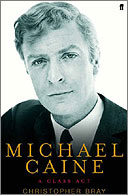
Michael Caine: A Class Act
by Christopher Bray
504pp, Faber, £20
At the time of his 1992 memoir What's It All About?, Michael Caine wrote that there had been "at least seven biographies of me". Christopher Bray's addition to the canon is concerned with the "figurative" Michael Caine, his cinematic persona - at least in those of his films that comment on the times they portray. This covers only a portion of Caine's oeuvre; for every Get Carter, there's a Blame It on Rio. As Bray points out in the closing pages: "Perhaps he will do anything for the money, but while doing anything he will do everything to make that anything something."
In its aim to use Caine's story to document a story of class in 20th-century Britain, A Class Act is most successful in the early chapters, when Caine is a bit-part player in a wider story, rather than the lead. It's well documented that his father worked at Billingsgate market and that the actor was born and raised around Camberwell and the Elephant & Castle. Bray uses other celebrated locals - itinerant and otherwise - to offer insights into the lives of the natives. He quotes VS Pritchett, raised in Camberwell a generation or two before Caine: "The south of London has always been unfashionable and its people have stuck to a village life of their own; they were often poorish, but poverty or rather not having much money yet managing on it has its divisions and subdivisions of status."
The distinction between the north and south of the river was, in many ways, as marked as that between the north and south of the country; London's bridges are a symbolic divide between the poor relation of southeast London and the wealth of the West End and the City. When, by the mid-1960s, Michael Caine had made that transition, sharing a flat in Harley Street with his contemporary from the East End, Terence Stamp, the pair collaborated on a script entitled Across the River. It told the story of a boy like Caine who had made that leap. The project was one of a number within the actor's career that never came to fruition. He turned down the chance to work with Hitchcock. A project with Billy Wilder, after the director witnessed Caine's cross-dressing psychopath in Dressed to Kill, came to nothing. Orson Welles and Caine were originally earmarked for the screen adaptation of The Dresser. And Caine has never returned to the theatre since his days in rep, rejecting a chance to resurrect his role in Neil Simon's California Suite on Broadway because of stage fright.
Caine was an apprentice actor while John Osborne was putting Jimmy Porter on the stage, the first of a gang of working-class anti-heroes that would soon dominate the British cinema. But even as late as 1957, the film director Lindsay Anderson claimed that "an actor with a regional or a cockney accent should lose it quick ... for where are his chances of stardom?" Caine made his name too late to cash in on the angry young man trend in the theatre of the mid-50s, and success came before television drama gave itself over to a vérité style and working-class accents a decade later.
He always played the ones that had got away; those that had crossed the bridge. His roles were largely those of the cockney who had moved out of his native postcode and poverty via crime and vice. This is not a reflection on Caine but on British cinema itself, which has largely depicted working-class aspiration by way of a Pygmalion-style makeover at the hands of a middle-class professor (Educating Rita), or a wealth that is the by-product of gangland and pimping (Mona Lisa).
In Alfie, he was not like Arthur Seaton in Saturday Night and Sunday Morning, a hedonistic factory worker, or the scrupulous opportunist Joe Lampton in Room at the Top, or the frustrated Vic Brown in A Kind of Loving. "Alfie,", Bray writes, "was a kitchen-sink drama refracted through the multicoloured, kaleidoscopic gaze of the swinging London movie." And again, this is not a reflection on the actor but on British cinema at the time which, while attempting to present an accurate picture of northern working-class life, was preoccupied with depicting the south in terms of a swinging London that existed within a few West End streets and the minds of those who occupied them.
Despite being synonymous with that era, Caine's heart belongs to another decade altogether. He had worked too long and too hard to be summed up by "quick money, quick fame". And the political activism that came to the fore after 1968 was the antithesis of Caine's beliefs. It was the 1980s that ushered in "the kind of government he had, perhaps always, wanted", writes Bray. "Self-made men like Caine were just the kind that Thatcher favoured." Or as the biographer's subject put it himself at some point in the 1970s: "I made the actor, nobody else. No academy, no teacher, no grants from the government. So now I can sit here and say, 'I owe nothing to anybody'." It's a sentiment that Alfie Elkins, Jack Dodds, Harry Palmer and Jack Carter would salute.
· Michael Collins's The Likes of Us: A Biography of the White Working Class is published by Granta

